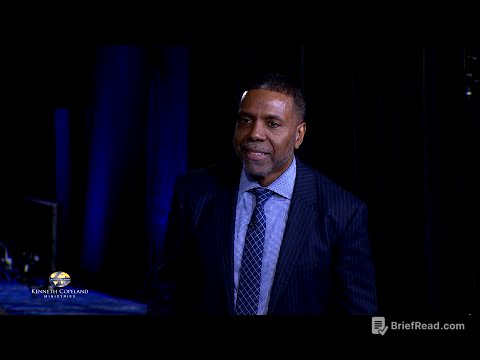TLDR;
In this sermon, Kevin Wallace introduces the series "Beyond the Roman Road," emphasizing that Romans is not a mere formula but a profound exploration of grace. He addresses the universal guilt of mankind and God's grace, aiming to provide a foundational understanding of salvation. The sermon also tackles division within the church, advocating for unity on essential doctrines and love in all things.
- The book of Romans is not a formula, but a deep exploration of grace.
- All mankind is guilty, but God has graced our lives with His goodness.
- Unity on essential doctrines and love in all things are crucial for the church.
Introduction: Beyond the Roman Road [0:01]
Kevin Wallace introduces his new series, "Beyond the Roman Road," based on the book of Romans. He clarifies that the Roman Road, a popular evangelism tool, should not reduce the book of Romans to a mere formula. Instead, he emphasizes that Romans is a comprehensive treatise on the theology of grace. The initial message is foundational, addressing the guilt of all mankind and the grace of God. Wallace aims to guide the congregation through the text, highlighting that while everyone is guilty, God's grace offers redemption.
Paul's Transformation and the Church at Rome [6:33]
The author discusses the significance of the book of Romans, highlighting its author, formerly known as Saul of Tarsus, a Jewish rabbi and Pharisee. Saul persecuted Jesus' followers until he encountered the resurrected Jesus on the road to Damascus, leading to his conversion and transformation into Paul the Apostle. Paul then preached the gospel throughout the Roman Empire, gathering believers into churches. The church at Rome consisted of both Jewish and Gentile believers, creating tension due to their different backgrounds and practices.
Conflict and Division in the Roman Church [11:12]
The speaker explains that the Roman church faced conflict due to the expulsion and subsequent return of Jewish members, leading to disagreements on customs and practices. Paul wrote to address these divisions, emphasizing unity on essential doctrines and love in all things, quoting Father Augustine. He stresses the importance of focusing on core beliefs such as the virgin birth, sinless life, crucifixion, and resurrection of Jesus, rather than non-essential issues that cause division.
Purpose of Paul's Letter and the Need for Teaching Romans [15:48]
Paul wrote to the Roman church to clarify that salvation is through Christ alone, not through works. He also aimed to use the Roman church as a launching pad for missions further west, believing that if the gospel could transform Rome, it could transform any city. The speaker advocates for teaching the book of Romans more frequently, lamenting that it is often neglected because it requires deep understanding rather than mere emotional appeal. He criticizes the cycle of defeat where people experience temporary religious highs without lasting transformation.
Romans 1-3: Proving the Guilt of Humanity [18:38]
The author summarizes Romans 1-3, portraying Paul as a district attorney proving the guilt of all humanity. Romans 1 and 2 describe the depravity of the Gentiles, while Romans 3 addresses the Jews, stating that both are equally lost. He condemns the Gentiles' rebellion and the Jews' reliance on moral religion and law-keeping. The speaker clarifies that salvation is not through keeping the law of Moses or having Jewish blood but through Jesus Christ.
The Depravity of Humanity and the Need for Jesus [22:38]
The speaker emphasizes the depravity of humanity as described in Romans, highlighting that sin is not normal and should not be excused. He points out that Paul's harsh assessment of human nature underscores the necessity of Jesus' sacrifice. The speaker references specific sins mentioned in Romans, including homosexuality and heterosexual sin, and stresses that sin mars the image of God in humanity. He urges listeners to recognize their guilt and turn to Jesus for salvation.
The Law as a Mirror and the Gift of Grace [28:59]
The speaker contrasts the Gentiles' sins with the Jewish people's reliance on the law, stating that attempting to please God through law-keeping is futile. He uses the analogy of a treadmill to describe the fruitless effort of trying to earn salvation through works. The law is like a mirror, revealing our flaws but not fixing them. The only solution is to turn to Jesus Christ, whose sacrifice is the only way to please God. Grace is a gift, not a wage earned through works.
Justification by Faith and the Rejection of Boasting [31:46]
The speaker explains that no one, Jew or Gentile, has a basis to claim righteousness before God. He criticizes the tendency to boast and feel superior to others, emphasizing the need for humility and appreciation for Jesus' work. He references Romans 3:9-28, highlighting the indictment of humanity's sinfulness. Justification comes through faith in Jesus Christ, not through works of the law.
Born Again by the Grace of God [37:54]
The speaker asserts that humans are born sinful and must be born again to enter the kingdom of God. He clarifies that being born into sin does not dictate one's destiny, as being born again transforms a sinner into a saint through God's grace. He criticizes the tendency to measure and compare sins, emphasizing that all sins must be under the blood of Jesus. The speaker encourages listeners to embrace the truth and find freedom in Christ.
The Sinking Ship Analogy and the Need for a Savior [42:20]
Using the analogy of a sinking ship, the speaker illustrates that everyone, regardless of their status or background, needs a savior. He references Romans 3:19, stating that all the world may become guilty before God. The law serves as a mirror, revealing our sinfulness and pointing us to our hopelessness in ourselves. The speaker emphasizes that instead of trying to fix ourselves, we should run to Jesus Christ to deal with our sin.
Grace as a Gift and an Altar Call [46:15]
The speaker concludes by emphasizing that grace is a gift, not a wage earned through works, referencing Romans 4:4. He encourages those who have been working for something they already have to come off the treadmill and receive God's grace. The speaker extends an altar call, inviting those who need love to rescue and save them to come forward and receive the free gift of God's grace. He leads the congregation in a song of praise, celebrating God's love and grace.









